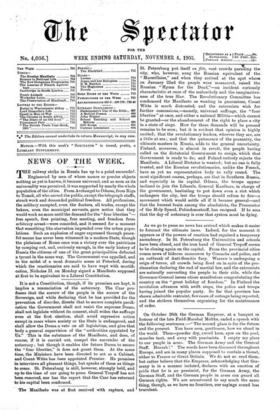St. Petersburg put itself en fête, vast crowds pare ing
the city, who, however, sung the Russian equivalent of the " Marseillaise," and when they arrived at the spot where on January 22nd the people were massacred, raised the Russian "Hymn for the Dead,"—an incident curiously characteristic at once of the melancholy and the imaginative- ness of the true Slay. The Revolutionary Committee has condemned the Manifesto as wanting in guarantees, Count Witte is much distrusted, and the extremists wish for further concessions,—namely, universal suffrage, the "four liberties" at once, and either a national Militia—which cannot be granted—or the abandonment of the right to place a city in a state of siege. How far these demands will be pressed remains to be seen ; but it is evident that opinion is highly excited; that the revolutionary leaders, whoever they are, are a little at sea ; and that the quiescence of the peasantry, the ultimate masters in Russia, adds to the general uncertainty. Finland, moreover, is almost in revolt, the people having called on the dictatorial Government to resign, which that Government is ready to do; and Poland entirely rejects the Manifesto. A Liberal Dictator is wanted ; but no one is fully trusted, and the Russian revolutionaries, unlike the French, have as yet no representative body to rally round. The most significant omens, perhaps, are that in Southern Russia, and especially in its capital. Odessa, the troops appear inclined to join the Liberals, General Kaulbars, in charge of the government, hesitating to put down even a riot which endangers the city, lest the troops should refuse to fire—a movement which would settle all if it became general—and that the keenest brain among the absolutists, the Procurator of the Holy Synod, Pobiedonostzeff, has resigned. If he sees that the day of autocracy is over that system must be dying.


























































